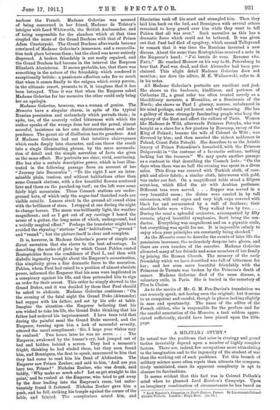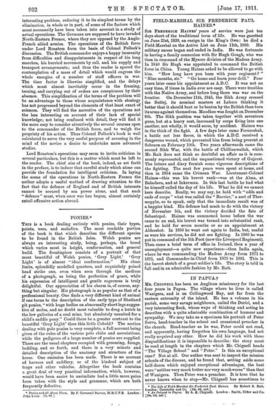A MILITARY STIIDY.* In actual war the problems that arise
in strategy and grand tactics invariably depend upon a number of highly complex factors. There are, indeed, few occupations more stimulating to the imagination and to the ingenuity of the student of war than the working out of such problems. Yet this branch of military science more often repels than attracts the compare. tively uninitiated, since its apparent complexity is apt to obscure its fascinations.
It seems evident that this fact was in Colonel Pollock's mind when he planned Lord Boastem's Campaign. Upon an imaginary combination of circumstances he has based an
• Lord Roastent's Campaign in North-Eastern France. ByLieutenant-Colouel Alsagei Pollock. Loudon : Hugh Bees. [2s. 6d.]
interesting problem, reducing it to its simplest terms by the elimination, in whole or in part, of some of the factors which must necessarily have been taken into account in a study of actual operations. The Germans are supposed to have invaded North-Eastern France, where they are opposed by the Anglo- French allied armies. The operations of the British force under Lord Roastem form the basis of Colonel Pollock's discussion. The British commander enjoys a happy immunity from difficulties and disappointments in respect of his long marches, his hurried movements by rail, and, his supply and transport arrangements; and thus the reader is spared the contemplation of a mass of detail which would engross the whole energies of a number of staff officers in war. The time factor is likewise simplified, and the delays which must almost inevitably occur in the framing, issuing, and carrying out of orders are conspicuous by their absence. This simplification of the terms of the problem will be an advantage to those whose acquaintance with strategy has not progressed beyond the elements of that least exact of sciences. They will find the narrative of the operations not the less interesting on account of their lack of special knowledge; not being confused with detail, they will find it the more easy to consider attentively the several courses open to the commander of the British force, and to weigh the propriety of his action. Thus Colonel Pollock's book is well calculated to serve the very useful purpose of arousing in the mind of the novice a desire to undertake more advanced studies.
Lord Roastem's operations may seem to invite criticism in several particulars, but this is a matter which must be left to the reader. The chief aim of the book, indeed, as set forth in the preface, is to induce that careful study which alone can provide the foundation for intelligent criticism. In laying the scene of the operations in North-Eastern France the author adopts a useful method of drawing attention to the fact that the defence of England and of British interests cannot be secured by sea power alone, and that such " defence " must, when once war has begun, almost certainly entail offensive action abroad.











































 Previous page
Previous page